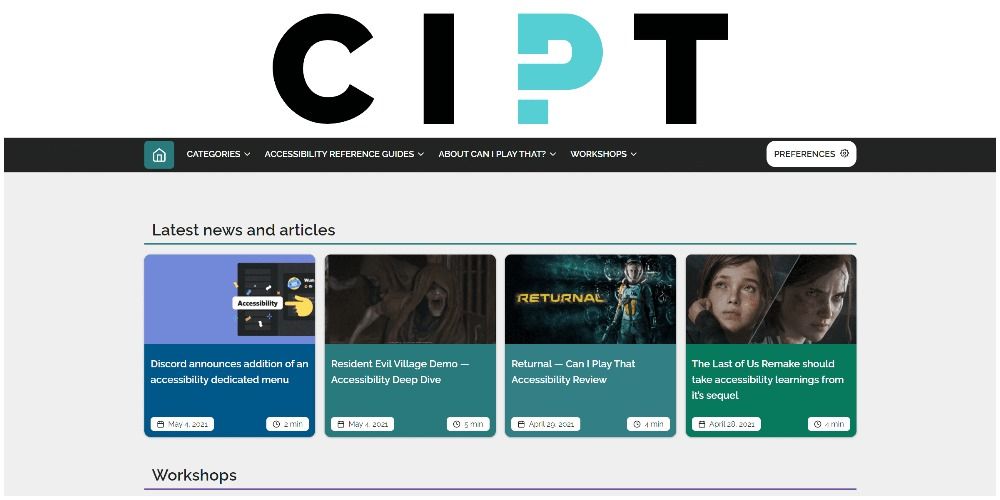Simply being able to play a video game is often taken for granted among gamers. For disabled players, there is a lot more to picking out and playing a video game. For the visually impaired, hearing impaired, and those recovering from strokes, just to name a few conditions, settling down with a video game can have extra steps. Extra consideration has to be made in terms of building an accessible PC and/or finding a console and controller that works best for them. Outside of hardware, choosing games based on their accessibility can be difficult: For example, the need for legible subtitles, clear waypoint markers, and/or settings to reduce visuals that are too busy.
For disabled gamers, the website, "Can I Play That?" (CIPT) reviews games through the lens of accessibility. This month, the website reviewed Horizon Forbidden West, giving it a 5.5 out of 10, with its pros listed as easy loot systems, remapping, assist features, and lit-up climbable ledges, while its cons listed as small subtitles, illegible text, and combat that requires precision. These accessibility reviews are just one of many amazing ways CIPT covers the experience of disabled players, as they also provide inclusivity workshops, news, commentary, and personal stories.
The Website's History And Games Codex
"Can I Play That" started out as a hobby site in 2018 for deaf accessibility in video games, but snowballed into a valuable outlet and news source for all sorts of disabled gamers. According to its "About" page, CIPT has been shared internally among gaming giants like PlayStation, Xbox, Square Enix, and Ubisoft. The outlet's pieces on accessibility, particularly for The Last Of Us 2, have been used as a news source for publications like USA Today and CNN. Its review for Gears of War 5 even got a shout-out from Microsoft; that's strong recognition for a website that has only existed for about four years, but it is well-deserved.
Just recently, CIPT introduced a "Games Codex," a database of developers, publishers, and games, all about accessibility. Gamers can search alphabetically, by platform, and genre to see information for games like Animal Crossing: New Horizons, Phasmophobia, and The Outer Worlds. Under each title, CIPT lays out its general information and includes every article they have written about the game. For example, under The Outer Worlds, they have done a "Deaf Game Review" and "Blind Impressions."
News, Reviews, And 'How/Why I Play'
Under their news articles, CIPT keeps up with current gaming news through the perspective of accessibility. For example, some of their recent headlines are "Elden Ring has a few accessibility improvements it seems" involving Elden Ring's under-appreciated accessibility options, as well as articles like "PlayStation VR 2 headset design features could be useful for accessibility". Along with reviews of accessibility in games, the writers sometimes do deep dives and commentary on games and consoles.
For more personal stories, the "How/Why I play" section has pieces on how disabled players have played certain games or built their PCs. One describes how a gamer played Typing of the Dead: Overkill without using their hands, while another tells a story on experimentation with video games and voice recognition. Not all of the site's content is about purely physical disability either, as there are also plenty of articles about gaming and its relationship with mental health, autism, schizophrenia and ADHD. Articles like "Playing with Schizophrenia in Prey" and "In Video Games, Contradictions of Being Autistic with ADHD Make Sense".
The Workshops And Contributors
The workshops of CIPT teach about how to have inclusivity and accessibility for disabled gamers. One workshop model is meant for game writers, and another is for game studios, streamers, and developers. The workshop page also has a blog with checklists and examinations of how to make language less ableist in games.
The content creators for the site include a dedicated staff team, but the site is also open to submissions by disabled gamers for certain content, such as about how they play games, why they play games, and more analytical features. Inclusivity is paramount to the website's mission and community, as its founders are queer, deaf, chronically ill and disabled, Muslim, transgender, and immigrants. The contributors certainly practice what they preach, as the website itself has preferences for greater accessibility, such as having options for a dark mode, enlarged text, progress bar, and high contrast.
Can I Play That is a beneficial resource for everyone involved in the games industry, and for disabled gamers, is an essential resource for their continued interest and involvement in video games and game development.
Source: Can I Play That




